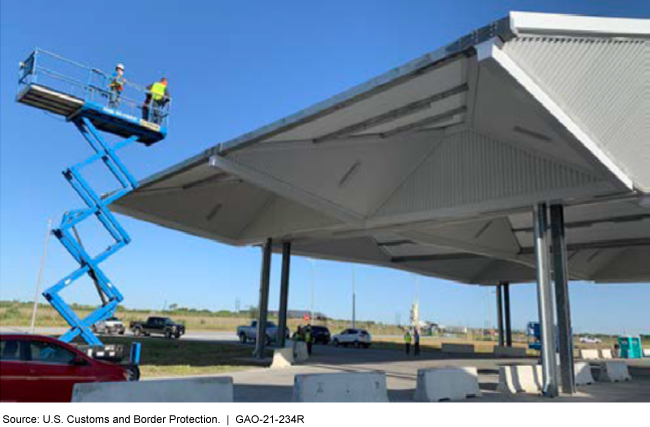U.S. Ports of Entry: Update on CBP Public-Private Partnership Programs
Fast Facts
Over 650,000 people and nearly 78,000 truck, rail, and sea containers entered the U.S. every day in FY 2020 through 328 ports of entry.
U.S. Customs and Border Protection uses 2 public-private partnership programs to expand its port services. One allows partners such as port authorities to reimburse CBP for additional work outside regular hours. Another accepts donations for infrastructure improvements, which could speed up CBP's work.
CBP added 25 reimbursement partnerships and 1 donation partnership since 2013. Most focus on processing air freight, cargo, and travelers.
Outbound Commercial Inspection Facilities Donated to U.S. Customs and Border Protection at the Donna Rio-Bravo Land Border Crossing

Highlights
What GAO Found
Since GAO's January 2020 report, U.S. Customs and Border Protection (CBP), within the Department of Homeland Security, continued to expand its public-private partnership programs—the Reimbursable Services Program (RSP) and the Donations Acceptance Program (DAP). The RSP allows partners, such as port authorities or local municipalities that own or manage ports, to reimburse CBP for providing services that exceed CBP's normal operations, such as paying overtime for CBP personnel that provide services at ports of entry (POE) outside regular business hours. The DAP enables partners to donate property or provide funding for POE infrastructure improvements.
Regarding RSP, in 2020, CBP selected an additional 25 RSP applications for partnerships, bringing the total of RSP selections to 236 since 2013. There are many factors that CBP considers when reviewing applications for RSP including operational feasibility, and CBP may choose to not select certain applications. According to officials, CBP denied three RSP applications since GAO's January 2020 report. For example, CBP denied one application because the proposed agreement site was located too far away from the nearest CBP facility to make CBP officer travel time practicable. As of October 2020, CBP and its partners executed 157 memoranda of understanding (MOU) from RSP partnerships that they entered into from fiscal years 2013 through 2020. These MOUs outline how agreements are to be implemented at one or more POE. Of those 157 MOUs, 11 cover agreements at land POEs, 49 cover agreements at sea POEs, and 99 cover agreements at air POEs. The majority of MOUs executed since 2013 were at air POEs and focused on freight, cargo, and traveler processing. Although the number of RSP partnerships has increased, the growth in the total number of reimbursable CBP officer assignments, officer overtime hours, and the amount of reimbursed funds provided to CBP declined significantly in 2020. CBP officials explained that the decline in trade and travel at U.S. POEs contributed to the decline in requests for RSP services.
Regarding DAP, in fiscal year 2020, CBP entered into one new donation acceptance partnership, bringing the total number of agreements to 39 since fiscal year 2015. Partners span a variety of sectors such as government agencies, private companies, and airline companies. Correspondingly, program donations served a variety of purposes such as expanding inspection facility infrastructure, providing biometric detection services, and providing luggage for canine training. As of October 2020, 27 out of 39 these projects, or 69 percent, were at land POEs. CBP officials estimated that the total value of all donations entered into between September 2015 and October 2020 was $218.2 million.
Why GAO Did This Study
On a daily basis in fiscal year 2020, over 650,000 passengers and pedestrians and nearly 78,000 truck, rail, and sea containers carrying goods worth approximately $6.6 billion entered the United States through 328 U.S. land, sea, and air POEs, according to CBP. To help meet demand for CBP inspection services, since 2013, CBP has entered into public-private partnerships under RSP and DAP. The Cross-Border Trade Enhancement Act of 2016 included a provision for GAO to annually review the agreements along with the funds and donations that CBP has received under RSP and DAP. GAO has issued three annual reports on the programs—in January 2020, March 2019, and March 2018. This fourth annual report updates key information from GAO's January 2020 report by examining the status of CBP public-private partnership program agreements, including the purposes for which CBP used the funds and donations from these agreements in fiscal year 2020. GAO collected and analyzed all RSP agreements, DAP agreements, and MOUs for both programs for fiscal years 2019 and 2020, excluding those analyzed in GAO's January 2020 report. GAO also analyzed data on use of the programs and interviewed CBP officials to identify any significant changes to how the programs are administered.
For more information, contact Rebecca Gambler at (202) 512-8777 or GamblerR@gao.gov.
